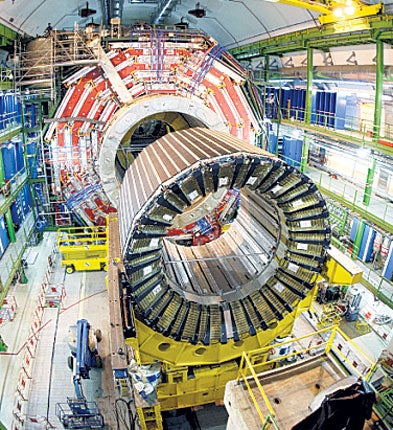We may not have found God particle after all, admits Hadron chief

Fevered speculation about the discovery of the so-called "God particle" by physicists at Europe's underground atom-smasher experiment is premature, according to the director general of the European Organisation for Nuclear Research (Cern) near Geneva.
Professor Rolf Heuer said yesterday that his scientists had detected "intriguing fluctuations" in the data gathered by Cern's Large Hadron Collider (LHC), which is searching for the elusive Higgs boson, a subatomic particle predicted by Professor Peter Higgs of Edinburgh University in the 1960s but so far never detected.
Professor Heuer cautioned that the data fluctuations detected by Cern scientists may turn out to have nothing to do with the Higgs boson and could even be random statistical "noise" generated when beams of protons are crashed together within the LHC at velocities just short of the speed of light.
The Higgs, mischievously nicknamed the "God particle" by one physicist, is predicted to confer mass to other sub-atomic particles and matter. If it exists, the LHC – a 27km circular tunnel that straddles the Swiss-French border – is powerful enough to detect it, but researchers have first to eliminate any random fluctuations that could interfere with their observations, which is why they are urging caution about these early results.
"Don't expect too much too quickly," Professor Heuer said at an international meeting of physicists in Grenoble to review the LHC's first few months of gathering data. "You have to be careful about combining small numbers because you can easily be fooled.
"I hope the first big discovery will come next year, namely the discovery of the Higgs boson. I have learned in life to be patient, something will come," he said.
It is still possible that the particle does not actually exist, but that would mean physicists would have to abandon the Standard Model, their fundamental theory of how the many different subatomic particles interact with one another.
Two experiments attached to the LHC, called Atlas and CMS, are both detecting interesting fluctuations in the "low mass" region of energy levels where the Higgs could exist, according to Professor Heuer. However, so far the evidence is still equivocal and is unlikely to be strong enough to confirm or refute the existence of the Higgs until the end of 2012.
"I think towards the end of next year we'll have the answer. The Higgs is not like any other subatomic particle. The difference is that with the Higgs we know everything about it, but whether it exists," Professor Heuer said.
"[Its discovery] will come slowly. In the meantime you will hear what I can only call rumours, but slowly the right signal will be creeping up, and we need to see it creeping up in both experiments," he said. "We are really living in exciting times for particle physics. To a large extent it's due to the LHC. It's working really well, beyond my expectations.
"Now it's bringing us into unchartered territory. We are still missing the Higgs boson, the key particle of the Standard Model. If we find it, the Standard Model is complete, and if we don't find it, then the Standard Model has a problem," Professor Heuer said. "If we fail to find the Higgs, the Standard Model is no longer valid as we know it today."
Join our commenting forum
Join thought-provoking conversations, follow other Independent readers and see their replies
Comments
Bookmark popover
Removed from bookmarks